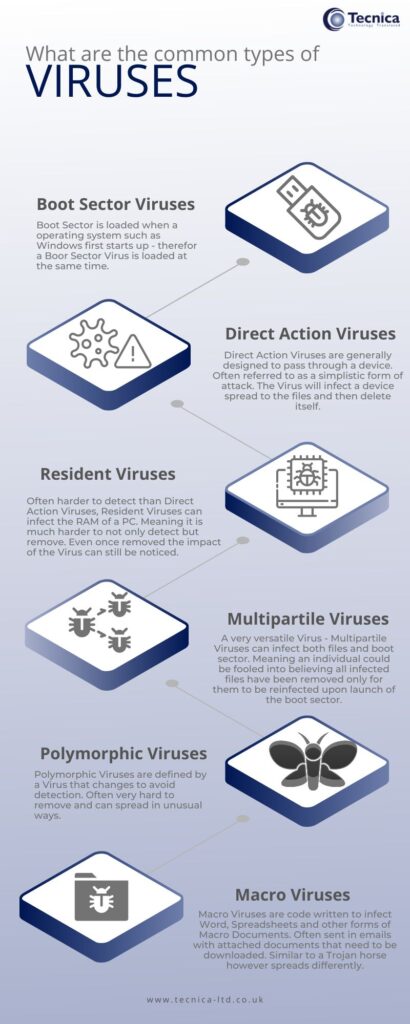Viruses can be highly damaging to both your devices and organisation. A computer virus is a type of malicious code that can disrupt or damage a PC. While viruses fall under the broader category of malware, not all malware is a virus.
Malware is an umbrella term for malicious software or code designed to harm a computer, network, or server. Although all viruses are malware, they are unique in their behaviour. For instance, viruses spread differently from other types of malware like worms, which makes them distinct from general malware threats.

Types of Viruses
Boot Sector Virus
A Boot Sector Virus infects the boot sector of an operating system, such as Windows, and is activated when the system starts up. Although rare today, this type of virus originally spread through USB drives, CD-ROMs, or floppy disks. Now, it can also be transmitted via email attachments.
Direct Action Virus
Direct Action Viruses are straightforward and designed to act quickly. They infect a device, spread to files, and then delete themselves, often being easier to detect and remove.
Resident Virus
Resident Viruses are more elusive, infecting the computer’s RAM and making them challenging to detect and eliminate. Even after removal, their impact can persist, causing files to be corrupted or enlarged, potentially hindering system performance.
Multipartite Virus
Multipartite Viruses are versatile, attacking both the boot sector and files. This dual capability means that even if the infected files are removed, the virus can reappear when the boot sector is activated.
Polymorphic Virus
Polymorphic Viruses change their code to evade detection, making them difficult to identify and remove. They often spread through unconventional methods, increasing the challenge of containment.
Macro Virus
Macro Viruses target applications like Word or Excel by embedding malicious code in macro documents. Typically spread via email attachments, they behave similarly to Trojan horses but propagate in a distinct manner.
Protecting Against Viruses
Defending your organisation from increasingly complex cyber threats is a challenging task. At Tecnica, our certified consultants take a comprehensive approach to IT security. We offer robust protection against cyber threats and help prepare your organisation for potential attacks.
With over 35 years of experience, our team is committed to safeguarding your business from cyber attacks. Many organisations across Scotland trust Tecnica to manage the critical task of maintaining their cyber security.
To discover how your organisation could be better secured visit: Cyber Security Services Scotland – IT Security – Tecnica Ltd (tecnica-ltd.co.uk)

